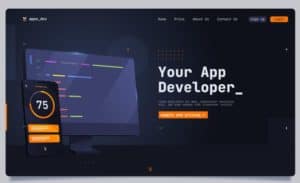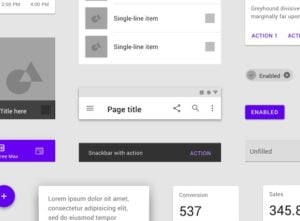After Apple’s disastrous launch of MobileMe, Steve Jobs told the responsible developers they “should hate each other for having let each other down.”
The Queensland health department outsourced payroll software development to IBM, preparing to spend $6M and pulled the plug at $1.2B, for a flawed application.
Finding an accomplished app developer is tough, whether you hire or outsource.
And if you still think that finding the right developer is all about in-house vs. outsourcing, please continue reading. We’ll discuss alternatives, and you’ll learn how to hire an app developer in the USA without hitting a brick wall.
Table of Contents
- Who to Hire When You Need App Developers
- Where to Find Mobile App Developers
- Top 9 Tips to Hire An App Developer
- Questions to Ask When Hiring an App Developer
- Common Mistakes When Hiring a Mobile App Developer
- Is Topflight Apps for you?
Who to Hire When You Need App Developers
When you’re ready to move on with your custom app development, you will need to answer a very critical question: “Who will be creating my application?”
There are a few options available, each with its own pros and cons, but you should know that every option works. Some will get you a working solution faster. Others will tempt you with smaller app development budgets, but in the end, all these approaches get things done.
Once you’re done with this blog, you’ll know yourself what variant will work best for your specific case. Sweet-talking you into going with a dedicated mobile app development agency because Topflight belongs there is the last thing on my list.
In-House team
The most traditional approach is to put together an in-house team and use internal resources to build a mobile product. If you already have app developers, that means prioritizing your other projects.
However, if you’re starting from scratch, that means spending a lot of time and money during the hiring process and then on retaining developer talent.
Pros:
- Effective communications
- Own application development process end-to-end
- Enough resources to handle all development related tasks
Cons:
- Very high costs (full-time salary, equipment, office rent, etc.)
- Need perfectly set up HR operations
- Takes much time to find the right talent
The bottom line is you should go this route only if you’re well funded and have enough cash to burn until your product starts turning a profit. It is a decent option for well-established businesses with long-term plans for introducing new solutions and a plan B if they need to pivot.
Local boutique development shops
If you’re not ready to hire an in-house team, you can shop around for local boutique development shops. It looks like a really nice option all-around, and its limitations only start showing after development is underway.
Pros:
- Medium price range
- A dev shop takes care of project management
Cons:
- Often no expertise in UX/UI, product management, user testing, etc.
- Hard to scale to address a rapid growth of a solution
This approach will work for most startups ready to actively engage in the application development process. Business owners will take on the responsibility for product management, design, user testing, and other things that boutique dev shops often miss.
Freelancer
If you’re an entrepreneur, you’re more than likely to have already worked with freelancers on SEO, marketing, design, or copywriting, right? Well, you may find the right app developer among them too.
There are plenty of sites that will help you connect with thousands of potential candidates and hire a coder to make an app: from a novice programmer to seasoned freelance mobile app developer.
One thing to bear in mind is freelancers mostly work solo. Even when they team up, there’s no time-proven process or best practices in place that guarantee successful project completion.
Pros:
- Probably the best option for price shopping
- Can seek out particular expertise
Cons:
- A lot of time spent on project management
- Freelancers may go off the radar at random
Freelancing is best for rookies who have time to coordinate several independent professionals and look for a good bargain or contemplate equity payment options.
It’s essential to continue working with a chosen freelance app developer via a platform where you found them. That will give you at least some protection in case a freelancer suddenly goes missing.
Outstaffing
Outstaffing works for companies that already have some senior tech personnel who can manage outstaffed app developers. It’s almost like outsourcing, except it’s your CTO, COO, or product/project manager who is responsible for overseeing custom app developers’ work.
Pros:
- Can find resources fairly quickly
- Developers follow your best practices — lower chance of failure
Cons:
- Need to have tech-savvy, experienced managers
- Not always the best price-quality ratio
I recommend that you outstaff only if you have senior managers with a mobile development background, and outstaffed coders can easily tune into your existing procedures.
Body Shop Companies
Body shop companies have long existed in a somewhat gray area of software development. They specialize in providing on-site developer resources with ready H-1B visas.
Body shopping companies most often operate out of India and focus on training a wide range of IT specialists. Therefore, you may find yourself stuck with novice application developers sometimes.
Pros:
- Quickly find required talent from a large pool of developers
- Relatively easy to swap out underperforming coders
Cons:
- Demotivated, underpaid developers
- Convoluted payment arrangements
- High chance of hiring inexperienced resources
Clearly, body shopping is an approach that only veteran entrepreneurs with experience in different outsourcing models can adopt. If this is your first attempt at building a mobile product, I strongly advise you to hire mobile app developers using other tactics.
When hiring, look for mobile developers custom trained to meet the specific needs of your project.
Dedicated Mobile App Development Agencies
Dedicated mobile app development agencies are called dedicated for a reason. They make it their mission to deliver top-notch mobile solutions and employ a wide range of resources to do that.
Shipping a customer-ready application poised for success takes much more than finding a good app developer for hire. You will need user experience experts, designers, testers, DevOps engineers, and cybersecurity experts to build a mobile solution that’s worth taking chances.
Pros:
- Vast expertise with mobile platforms
- Resources in all disciplines required for mobile development
- End-to-end management of application production
Cons:
- Higher costs compared to the freelance and boutique shop models
- Serious preparation, so rarely an immediate start of development
If you are to hire top mobile app developers, you’ll naturally turn to dedicated mobile development shops. Many business owners opt for this model seeing it as an optimal transition mechanist to setting up an in-house team.
A dedicated mobile app development agency will code an app in this case and lay the foundation for further application development and maintenance.
Where to Find Mobile App Developers
Ok, let’s say you’ve narrowed down your options to hire an app development team to a few variants. Where do you go to look for experienced app developers?
Word of mouth
Getting started by checking with your friends and peers seems the easiest way to hire a mobile app programmer. In an ideal world, someone you trust built a mobile solution with a team and recommends these professionals to you.
In less ideal scenarios, you look for people who built an application resembling your idea that you really love using yourself. The downside is that your business may be in a different shape or stage than businesses whose recommendations you trust.
Job marketplaces
Marketplace platforms like Upwork and Toptal have recently become very popular. They often serve as a starting point on a quest to find a programmer for an app.
The main benefit of using such platforms is the ability to drill down into specific skills required for your mobile product, e.g., smartwatch app development, experience with Low Energy Bluetooth, or something even more niche like working with a particular NFC library on Android (to support a tap & pay feature).
Other advantages of job marketplaces include:
- Developer ratings
- Rich portfolios and client testimonials for each completed job
- Trusted escrow payment options
- Wide range of resources across various disciplines
- Solid developer vetting processes at some of these platforms
At the same time, the choice of available resources at some of these platforms may be overwhelming. Also, beware of fraud.
Rating sites
The next place where to find app developers is directory sites like Clutch or Good Firms that specialize in compiling developer ratings.
Clutch.co, based out of Washington DC, is quite efficient with rating companies and compiling lists of best-performing companies across different disciplines. For example, here are the lists of top iPhone and wearable app developers.
Other merits of going to such rating sites include:
- Verified customer testimonials
- Detailed case studies
- Specified price ranges for typical and completed projects
Of course, you should take company profiles on these directories with a grain of salt: the process for initiating a customer review starts with a developer’s request.
No one is interested in bad reviews because the site’s business model depends on selling ads to software development companies.
Social networking sites
You may also want to seek out top contributors on niche social networking sites where people discuss software development questions, e.g., Quora, Stack Overflow, or Reddit groups.
There’s a high chance these individuals are already busy with their own startups or actively contributing to other mobile projects. Still worth trying. That’s also a nearly ideal variant of finding a technical co-founder who can take over coding.
Top 9 Tips to Hire An App Developer
Ok, I promise zero gibberish pointers. Only the stuff that would have helped me 10 years ago when I was in your shoes, prepping to build my first mobile product and looking to hire app developers.
#1. Do you own due diligence
Perform a background check on your candidates looking specifically for poor experience in their past with targeted Google search, e.g., “company_name scam” or similar.
In addition to this, always check their online portfolios at Upwork, Clutch, Good Firms, and similar websites. Always ask for references from recent clients whom you can contact directly to inquire about their experience with the candidate.
#2. Don’t expect app developers to design an app
App developers are not designers. The idea here is that a very rare application developer will both design and build your app.
What you can and should expect from a great app developer, though, is the knowledge of whether provided designs are actually feasible on a given mobile platform. They should come up with suggestions for realizing features in line with a mobile platform’s best practice.
#3. They need to be efficient communicators
How well do they communicate? That includes how quickly they respond and whether they can intelligently address all your concerns.
Some developers may look down on you and constantly correct you because you use different terminology or confuse app development-related things.
What’s important is whether they completely understand you and can explain everything succinctly using your vocabulary.
If you’re probing a team and have to repeat the same thing to different team members over and over again, it’s a telltale sign to move on with your search and hire a programmer to make an app elsewhere.
#4. Look for niche expertise
Don’t assume that a great iPhone developer knows how to develop a breakthrough app for Apple Watch. The same goes for iPad applications that sit at the intersection of screen-constrained smartphone solutions and full-blown desktop software.
At the same time, do not demand rich experience in every technology that you plan to use. Just make sure app engineers have the expertise to implement the core features of your application.
#5. DevOps experience
Building a mobile application is more than putting together lines of code. A correctly set up process includes preparing development and test environments and tools for updating an app with newly developed features on the fly.
All of that presupposes decent experience in DevOps.
#6. Teamwork capabilities
When you hire mobile application developers to complement your existing team, you need to make sure that they can actually work as a single unit.
This almost goes back to assessing their communication skills, but in this case, you need to gauge their effectiveness in collaborating with other project participants.
#7. Check their contributions on GitHub
When you know your app requires knowledge of some specific technology, find the prospective developer’s profile on GitHub.
This site will show you if they have contributed to open-source projects for a given tech stack and provide an overall picture of the public projects they worked on. Your preference is, of course, professionals with a rich profile at GitHub.
#8. Testing infrastructure
Make sure they have all the required equipment for testing your application. Senior developers always keep an account on one of the professional testing sites that provide access to many mobile devices for testing mobile solutions.
#9. Start with a test task
When you feel like you are ready to hire an app programmer, try to pinpoint a small task from the project’s scope and run it as a trial. It can be as simple as a sign-in screen, but it will tell you everything about the candidate.
Did they think through scenarios when users input already registered credentials? Do they output intelligent error messages with actionable tips for users? Did they include an option to reset a password?
Questions to Ask When Hiring an App Developer
Here’s a good rundown on questions worth asking before you hire an application developer, and trust her with bringing your app idea to life. I will also include the answers you should be looking for.
Questions for iOS App Developers
Have they published apps to the App Store before?
Here you are actually asking about how many live apps they have shipped. Any insights into whether they encountered any issues when publishing apps and how they settled them with Apple would also be appreciated.
Do they work with Swift or Objective C?
Unless you’re stuck with a legacy iOS app written in Objective C, you’re looking for hands-on experience with Swift-based iOS applications.
What mobile platforms do they work with most of the time?
This question is easy to overlook, but the answer can have an immense impact on your project. For instance, app developers skilled in making iPad apps do not necessarily create delightful mobile experiences for the iPhone or Apple Watch, and vice versa.
Are they open to peers’ critique? What’s their stance on peer code review?
By asking a custom application developer to share a sample of their code, you are really checking how willing they are to open up to critique. You can always ask an independent, seasoned pro to audit their code and provide feedback. Pay close attention to how your candidates react to their code analysis.
Do they use any tools not provided by Apple in app development?
With this question, you clarify whether a native app developer creates iOS applications utilizing only vanilla Apple’s toolset or whether they have already worked with third-party libraries.
If they can show off such an experience, there’s a high chance your app will see the light of day faster as many pluggable components allow taking shortcuts in creating different app features.
What are their suggestions for improving your app’s security?
Talented software engineers will never forget to mention security best practices and explain how they can use them to better protect your customer data in the app.
Questions for Android App Developers
Do they use Kotlin or Java, and what’s their preferred tech stack?
It makes sense to choose Kotlin developers over Java simply because Kotlin programming language includes support for multiple platforms. Therefore, your app can be relatively easily ported across a wide range of devices (mobile and desktop) in case needed.
What design paradigm do they have experience with?
Not so long ago, it was fashionable to ship Android applications that visually mirrored their iOS counterparts. However, today Android customers expect skillful application of Material Design or other innovative design paradigms, e.g., Ant Design, Grommet, or Flat Remix.
Do they have experience with alternative app distribution models besides Google Play?
With that, you first clarify their knowledge of the Google Play app publishing process and second learn if they are familiar with alternative distribution models. This may be required for apps that are not intended for a broad public.
How do they handle edge-case scenarios?
If they ask what an edge-case scenario is, that’s a dead giveaway already. Edge-cases are often overlooked use-cases for using mobile apps out in the wild.
For instance, what happens if the app loses internet connectivity? How an app reacts when a user is trying to register with an existing username? High-quality veteran developers never miss such things.
What platforms do they work with mostly?
Android solutions for wearables, tablets, smartphones, and other devices belong to different worlds. Make sure they have plenty of experience with the platforms you’re targeting.
Questions for both iOS and Android developers
In addition to this list of questions, you can also throw in a couple of the following requests before you hire a developer to make an app.
- What software development approach or methodology do they follow (e.g., agile or waterfall)?
- How do they ensure the security of the development process?
- Can they work with a technically illiterate person?
- Have they done apps for this industry before? Can you try them out?
- Do they work with cross-platform app development tools?
Common Mistakes When Hiring a Mobile App Developer
What mistakes do business owners need to avoid to find a programmer to build an app that really stands out?
Hire a team-repelling star
Hire an app developer of an exceptional talent who does not want and does not know how to work in a team environment.
Make no mistake, these people are suitable for solo tasks. Still, you will need a really gifted sidekick on your team to bridge the star’s efforts with other team members’ work.
Pick a dev with a made-up portfolio
That happens more often than you’d think, and the most common scenario is when a portfolio misses live apps to download and play around with.
Hire a busy dev
It’s not uncommon when developers shift delivery deadlines, but acceptable only when there’s a good reason like a scope creep. Other times it’s because the app coder still hasn’t delivered on previous projects.
Choose a mobile engineer without niche expertise
If your app needs to connect to a smart device or rely on some advanced technology (machine learning), you cannot hire someone with no skills in these fields.
BLE, AI, and many other technologies require deep understanding and hands-on experience to be flawlessly executed.
Fail to connect with previous customers
Peer entrepreneurs are likely to give you a fair assessment of a developer’s performance. When you find a developer to build an app, and they look nearly perfect, but there are no previous clients to connect to, let it go.
Hire a dev shop from across the country
The time difference can be very challenging for someone who’s never done that before. You will likely need to adjust your daily routine to work effectively with a remote team of developers.
Go with an agency offering the cheapest rate per hour
A phone app developer for hire with the lowest hourly rate will likely deliver a poorly functioning product that fails to engage today’s demanding customers.
Choose an app developer who is lackluster about your app idea
If it’s only you who’s excited about your app idea, you need to reconsider an idea or find an engineer who’s as enthusiastic about it as you are.
Don’t discuss post-launch maintenance and support
When your application’s last feature is implemented and tested, will your app development team stick around to further maintain and support the app?
Is Topflight Apps for you?
We pride ourselves on specializing in a few areas that we believe bear the greatest potential for improving people’s lives:
- Healthcare apps
- Fintech apps
- On-demand apps
At Topflight, we work on the apps that democratize services and bring real value to customers and businesses. Our cornerstone service offering includes Rapid Prototyping — a best practice that helps us and our partners release market-ready solutions that customers love.
You are welcome to check out our work portfolio at Clutch and reach out to our app development experts if you are unsure how to find app developers in the US that get the job done the first time.
Related Articles:
- How much does app design cost?
- Agile App Development Cost
- Mobile App Frameworks Guide
- How long does it take to develop an app
- How to develop an MVP
- Mobile App Design Guide
Frequently Asked Questions
When is in-house the best option?
When you’re well-funded and have a detailed roadmap for your mobile product development for at least 1-2 years into the future.
When is outsourcing to a dedicated mobile agency the best?
When you are unsure how your product should look to best appeal to your target audience and need a team with versatile app development, design, and testing skills.
When should I go down the outstaffing route?
If you have established software development processes and senior technical staff to enforce these best practices and manage an outstaffed coder for an app.
Do you have any hints on hiring a capable app engineer on Upwork?
If you want to find a programmer to build an app on Upwork or similar job marketplaces, carefully review their previous work and organize an in-depth interview to uncover their interpersonal skills.
What is the best site to quickly seek out the best app phone developers for hire?
When selecting the best place to hire application engineers in the United States for the first time, definitely check out Upwork and Toptal.














